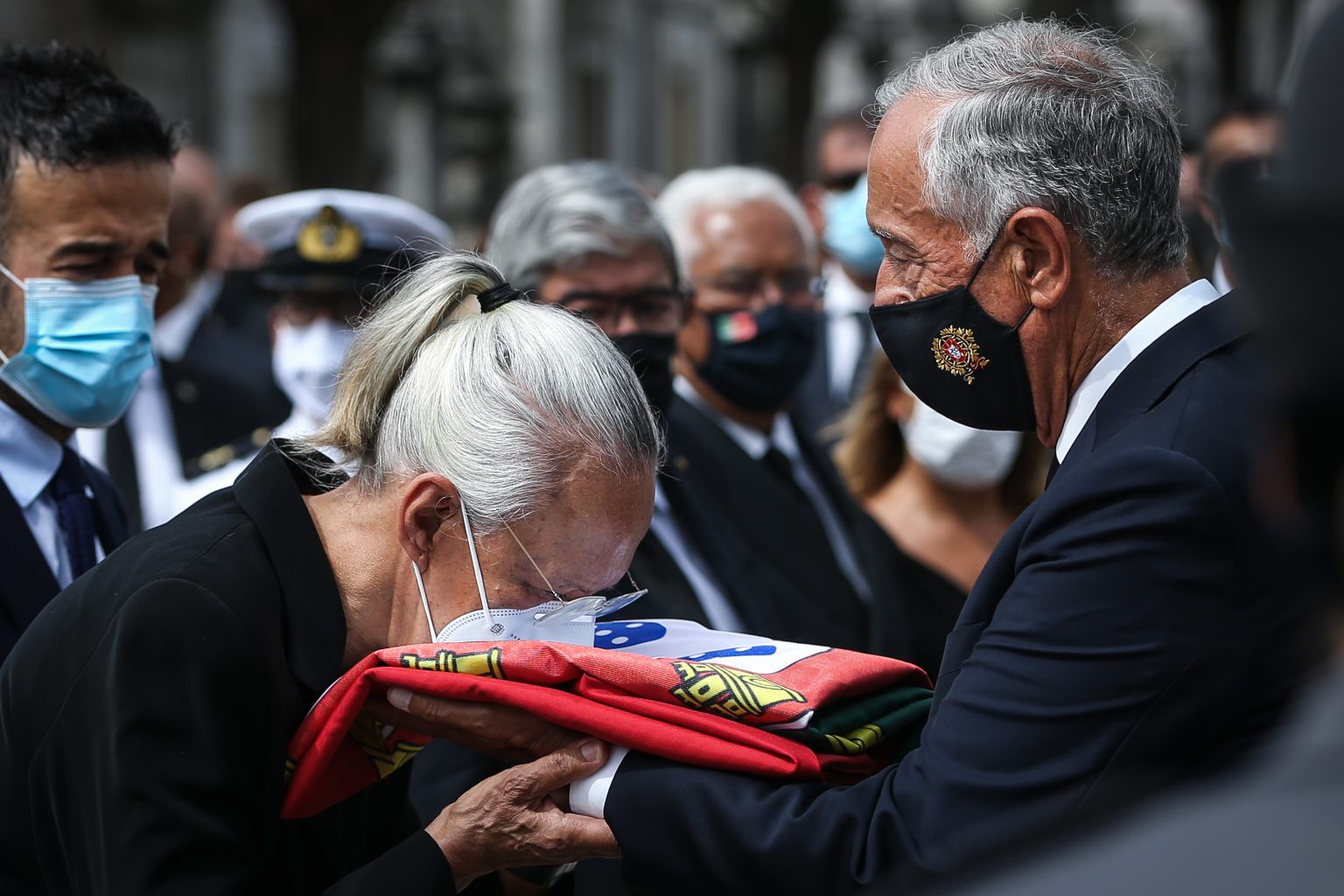The Portuguese bid farewell on Sunday to former President Jorge Sampaio in a solemn ceremony with the main figures of the state and foreign guests and with “cheers for freedom” near the Jeronimos Monastery in Lisbon.
The three main state figures, the President Marcelo Rebelo de Sousa, the speaker of parliament, Ferro Rodrigues, and the prime minister, António Costa, recalled the political career of Jorge Sampaio, who died on Friday at the age of 81.
His political life began during the dictatorship, in the 1960s as a student leader, he was a lawyer for anti-fascist militants, some of them from the Portuguese Communist Party, he was secretary-general of the Socialist Party, mayor of Lisbon (1990-1995), and president of Portugal (1996-2006).
“He never wanted to be a hero, but he became one,” Marcelo Rebelo de Sousa summed up in a final tribute to the former president, also stating that he “loved Portugal through fragility” and “not through strength”.
His two children, Vera and André Sampaio remembered their father as “a good man” who knew that in life and politics “, nothing can be done alone”.
“Our father was a good man, attentive and available, for whom people counted above all, not people in general, but each person with a name and a face,” stressed his daughter.
André Sampaio visibly moved, remembered his father as a man who was “popular without being populist, always close without ever trivializing closeness, who was a statesman and simultaneously an ordinary citizen, who was loved without liking to be venerated”.
The sons of the Prrsident, Vera and Andre Sampaio, during the funeral service for the late Portuguese President Jorge Sampaio at Jeronimos Monastery, Portugal, 12 september 2021. Jorge Sampa Funeral service for the late Portuguese President Jorge Sampaio at Jerónimos Monastery, Portugal, MIGUEL A. LOPES//LUSA Portuguese President Marcelo Rebelo de Sousa during the funeral service for the late Portuguese President Jorge Sampaio at Jerónimos Monastery, Portugal, MIGUEL A. LOPES//LUSA Funeral service for the late Portuguese President Jorge Sampaio at Jerónimos Monastery, Portugal, MIGUEL A. LOPES//LUSA Guard of honour carries the urn during the funeral service for the late Portuguese President Jorge Sampaio at Jerónimos Monastery, Portugal, RODRIGO ANTUNES/LUSA The urn during the funeral service for the late Portuguese President Jorge Sampaio at Alto de São João cemetery, Portugal, RODRIGO ANTUNES/LUSA Guard of honor carries the urn during the funeral service for the late Portuguese President Jorge Sampaio at Alto de São João cemetery, Portugal, ANTUNES/LUSA Guard of honour folding the national flag during the funeral service for the late Portuguese President Jorge Sampaio at Alto de São João cemetery RODRIGO ANTUNES/LUSA
This was followed by the words of Prime Minister António Costa, who, as a young man, trained in Sampaio’s law firm and was his campaign director in the 1996 presidential election, in which he beat the right-wing candidate, Cavaco Silva.
Portuguese democracy, he said, “can and should be proud to have been served by a great politician like Jorge Sampaio, and the country should be proud to have been presided over by an exemplary citizen like him”.
In the final part of his speech, he recalled Sampaio’s words in his inaugural speech as president in 1996 in parliament: “There are no expendable Portuguese.”
Ferro Rodrigues, who joined the Socialist Party the same year as Sampaio, in 1978, recalled: “the friend” who “chose to put his qualities at the service of causes” and whose example “will certainly endure and inspire many generations”.
“Jorge Sampaio was an illustrious Portuguese, and his example will certainly endure and inspire many generations,” he said.
Marcelo Rebelo de Sousa, the current president but who was his opponent in the 1989 local elections when Sampaio won the Lisbon city council with a left-wing coalition, gave the last speech at the ceremony that ended with the national anthem.
“He loved Portugal through fragility and so often in fragility. More than that, he made this fragility, his, our, all of our strength,” he said.
“He never wanted to be a hero, but he became one, in so many of his life’s actions, heroic. Of that discreet heroism, more lyrical than epic, sweeter than impulsive. Firm but sweet. And that is also why we remember him so sweetly. And we thank him for the love he never denied Portugal, for the way he loved Portugal,” Rebelo de Sousa added.
At the ceremony in the cloisters of the Jeronimos Monastery, the “Lacrimosa” from Mozart’s Requiem was played by the Choir of the National Theatre of São Carlos and the Portuguese Symphony Orchestra, and Jorge de Sena’s poem “A tiny light” was recited.
After the wake, on Saturday, which thousands of people attended, hundreds of people again stood in front of the Jerónimos Monastery this morning.
When the funeral procession left, there was again applause and slogans such as “Long live freedom”, “Long live Jorge Sampaio”.
After the evocative session at Jerónimos and the military honors at the Alto de São João cemetery, Lisbon, there was a short moment reserved for family and friends, who accompanied the coffin to the grave where it was laid to rest.
Former President of the Republic Jorge Sampaio died on Friday at the age of 81.
Before 25 April 1974, he was one of the protagonists of the academic crisis of the early 1960s, which generated a long and widespread movement of student protest against the Estado Novo. As a lawyer, he defended political prisoners during the dictatorship.
Head of State for ten years, after his Presidency, he was appointed in 2006 by the Secretary-General of the United Nations Special Envoy for the Fight against Tuberculosis. Between 2007 and 2013, he was UN High Representative for the Alliance of Civilisations.
Until his death, he chaired the Global Platform for Syrian Students, which he founded in 2013 to contribute to the academic emergency that the conflict in Syria had created, leaving thousands of young people without access to education.
NS/ADB // ADB.
Lusa
Artigo em português
Portugal: Tributo do Estado, aplausos e vivas pela liberdade para o falecido presidente
Os portugueses despediram-se no domingo do antigo Presidente Jorge Sampaio numa cerimónia solene com as principais figuras do Estado e convidados estrangeiros e com “vivas pela liberdade” perto do Mosteiro dos Jerónimos em Lisboa.
As três principais figuras do Estado, o Presidente Marcelo Rebelo de Sousa, o Presidente do Parlamento, Ferro Rodrigues, e o Primeiro-Ministro, António Costa, recordaram a carreira política de Jorge Sampaio, que faleceu na sexta-feira aos 81 anos de idade.
A sua vida política começou durante a ditadura, nos anos 60 como líder estudantil, foi advogado de militantes anti-fascistas, alguns deles do Partido Comunista Português, foi secretário-geral do Partido Socialista, presidente da Câmara Municipal de Lisboa (1990-1995) e presidente de Portugal (1996-2006).
“Nunca quis ser um herói, mas tornou-se um”, resumiu Marcelo Rebelo de Sousa numa última homenagem ao antigo presidente, afirmando também que “amava Portugal através da fragilidade” e “não através da força”.
Os seus dois filhos, Vera e André Sampaio, recordaram o seu pai como “um bom homem” que sabia que na vida e na política “, nada se pode fazer sozinho”.
“O nosso pai era um homem bom, atento e disponível, para quem as pessoas contavam acima de tudo, não as pessoas em geral, mas cada pessoa com um nome e um rosto”, sublinhou a sua filha.
André Sampaio, visivelmente emocionado, recordou o seu pai como um homem “popular sem ser populista, sempre próximo sem nunca trivializar a proximidade, que era um estadista e simultaneamente um cidadão comum, que era amado sem gostar de ser venerado”.
Seguiram-se as palavras do Primeiro-Ministro António Costa, que, quando jovem, formou-se na firma de advogados de Sampaio e foi o seu director de campanha nas eleições presidenciais de 1996, nas quais venceu o candidato de direita, Cavaco Silva.
The sons of the Prrsident, Vera and Andre Sampaio, during the funeral service for the late Portuguese President Jorge Sampaio at Jeronimos Monastery, Portugal, 12 september 2021. Jorge Sampa Funeral service for the late Portuguese President Jorge Sampaio at Jerónimos Monastery, Portugal, MIGUEL A. LOPES//LUSA Portuguese President Marcelo Rebelo de Sousa during the funeral service for the late Portuguese President Jorge Sampaio at Jerónimos Monastery, Portugal, MIGUEL A. LOPES//LUSA Funeral service for the late Portuguese President Jorge Sampaio at Jerónimos Monastery, Portugal, MIGUEL A. LOPES//LUSA Guard of honour carries the urn during the funeral service for the late Portuguese President Jorge Sampaio at Jerónimos Monastery, Portugal, RODRIGO ANTUNES/LUSA The urn during the funeral service for the late Portuguese President Jorge Sampaio at Alto de São João cemetery, Portugal, RODRIGO ANTUNES/LUSA Guard of honor carries the urn during the funeral service for the late Portuguese President Jorge Sampaio at Alto de São João cemetery, Portugal, ANTUNES/LUSA Guard of honour folding the national flag during the funeral service for the late Portuguese President Jorge Sampaio at Alto de São João cemetery RODRIGO ANTUNES/LUSA
A democracia portuguesa, disse ele, “pode e deve orgulhar-se de ter sido servida por um grande político como Jorge Sampaio, e o país deve orgulhar-se de ter sido presidido por um cidadão exemplar como ele”.
Na parte final do seu discurso, recordou as palavras de Sampaio no seu discurso inaugural como presidente no parlamento em 1996: “Não há português dispensável”.
Ferro Rodrigues, que aderiu ao Partido Socialista no mesmo ano que Sampaio, em 1978, recordou “o amigo” que “escolheu pôr as suas qualidades ao serviço das causas” e cujo exemplo “irá certamente perdurar e inspirar muitas gerações”.
“Jorge Sampaio era um ilustre português, e o seu exemplo irá certamente perdurar e inspirar muitas gerações”, disse ele.
Marcelo Rebelo de Sousa, o actual presidente, mas que foi o seu adversário nas eleições locais de 1989, quando Sampaio ganhou a Câmara Municipal de Lisboa com uma coligação de esquerda, fez o último discurso na cerimónia que terminou com o hino nacional.
“Ele amou Portugal através da fragilidade e tão frequentemente na fragilidade. Mais do que isso, ele fez desta fragilidade, a sua, a nossa, toda a nossa força”, disse ele.
“Ele nunca quis ser um herói, mas tornou-se um, em tantas acções da sua vida, heróica. Desse heroísmo discreto, mais lírico do que épico, mais doce do que impulsivo. Firme mas doce. E é também por isso que nos lembramos dele tão docemente. E agradecemos-lhe pelo amor que nunca negou a Portugal, pela forma como amou Portugal”, acrescentou Rebelo de Sousa.
Na cerimónia nos claustros do Mosteiro dos Jerónimos, o “Lacrimosa” do Requiem de Mozart foi interpretado pelo Coro do Teatro Nacional de São Carlos e pela Orquestra Sinfónica Portuguesa, e foi recitado o poema de Jorge de Sena “Uma pequena luz”.
Após o velório, no sábado, a que assistiram milhares de pessoas, centenas de pessoas voltaram a estar em frente ao Mosteiro dos Jerónimos esta manhã.
Quando o cortejo fúnebre partiu, houve novamente aplausos e slogans como “Viva a liberdade”, “Viva Jorge Sampaio”.
Após a evocativa sessão nos Jerónimos e as honras militares no cemitério do Alto de São João, Lisboa, houve um breve momento reservado à família e amigos, que acompanharam o caixão até à sepultura onde foi colocado para descansar.
O antigo Presidente da República Jorge Sampaio faleceu na sexta-feira, aos 81 anos de idade.
Antes de 25 de Abril de 1974, foi um dos protagonistas da crise académica do início da década de 1960, que gerou um longo e generalizado movimento de protesto estudantil contra o Estado Novo. Como advogado, defendeu os prisioneiros políticos durante a ditadura.
Chefe de Estado durante dez anos, após a sua Presidência, foi nomeado em 2006 pelo Secretário-Geral do Enviado Especial das Nações Unidas para a Luta contra a Tuberculose. Entre 2007 e 2013, foi Alto Representante da ONU para a Aliança das Civilizações.
Até à sua morte, presidiu à Plataforma Global para Estudantes Sírios, que fundou em 2013 para contribuir para a emergência académica que o conflito na Síria tinha criado, deixando milhares de jovens sem acesso à educação.
NS/ADB // ADB.
Lusa


